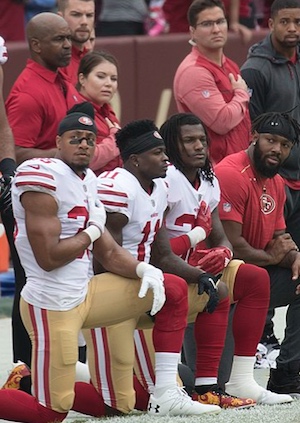By James Simpson | TNR Campus Watch
Nearly everyone by now has heard of the “take a knee” movement, which started in the NFL with San Francisco 49ers player Colin Kaepernick, started kneeling during the national anthem supposedly to protest racial injustice and police brutality. The movement has now found its way to college sports, as shown at a Nov. 4 basketball game between the University of Vermont and St. Michael’s College. Several SMC players knelt during the anthem, prompting both condemnation and support from the crowd.

The take-a-knee protest movement has spread from the NFL to college sports and elsewhere.
Kneeling during the national anthem is both unproductive and inappropriate. It does not accomplish anything and is unconnected with any clear and specific objectives. Protesters assert that it is to protest police brutality and racial injustice, but they give no specifics as to how kneeling will solve these issues. Kneeling before the flag does nothing to further their goals. It is pure virtue signaling.
If athletes are so concerned about their cause, there are more effective means of achieving change. They could sit down and have a discussion with their local chief of police. They could have a meeting with their elected representatives or write them letters. Or they could host a town hall event and bring the public and the police together to air their grievances. These would be much more effective than simply kneeling on the ground.
It is inappropriate because the flag represents the sacrifice that our service members have made, and continue to make, to protect our freedom as Americans. Kneeling before it is a disgrace to the lives lost and the sacrifices that continue to be made. While kneeling before the flag falls under freedom of expression, legality does not make it right. There is a time and a place for protest, and the singing of our national anthem is neither the time nor the place.
Another aspect regarding lack of appropriateness is that protesting while representing an organization, whether it be an employer or sports team, is unprofessional. When wearing a uniform representing an organization, one should remain politically neutral, so as to not misrepresent the organization or bring controversy or negative attention to it.
Some have criticized the crowd’s negative reaction to the players’ protest. But it’s important to remember that protest is a two-way street; if the players have a right to protest, then onlookers have a right as well to voice their disagreement.
As with any place on Earth, there are certainly issues this country faces. It is important that we put into perspective the freedom and safety we are afforded as American citizens. There is a time and a place to protest perceived wrongs, and during the national anthem is neither.
James Simpson is a third-year political science major at the University of Vermont. TNR Campus Watch highlights controversial issues taking place on Vermont’s college campuses.



Amen Ice Pick. Keep up the beautiful and informative articles. One day I will be voting for you as the President of the US of A. I am honored to know this Junior college student.
This article is succinct while covering the major points. I see no up side to athletes continuing this disrespectful activity at game time.